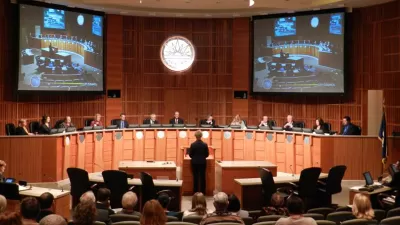The first in a new series by Planetizen: "Ask the Ethicist," featuring the advice of our resident expert: Carol D. Barrett, FAICP, author of "Everyday Ethics for Practicing Planners."

"Ask the Ethicist" allows planners to pose tough questions regarding ethical practices in planning to our resident expert: Carol D. Barrett, FAICP, author of Everyday Ethics for Practicing Planners.
Question: I'm a planner in the local city Planning Department. I recently received a communication from one the members of our city's planning commission regarding a property he intends to buy from a family member once a new zoning code amendment goes into effect. Should I report this as a conflict of interest, or is it "business as usual"?
Carol Barrett: The short answers to the two questions are, in order, "yes" to the conflict of interest and "no" to the business as usual.
In responding in such situations, I always try to give the benefit of the doubt and offer information that will help someone become aware that what they are contemplating is not ethical.
In this case, you already have some sort of relationship with the commissioner because he felt comfortable giving you a call. You can respond with a phone call back that covers some of the basics, such as the requirements under the Fair Political Practices Act to provide an annual list of any property owned (other than a single family home) and the need to refrain from participating in any decision that could directly impact the value of the property. I’d express it in terms like, "You may not have yet had a chance to think about the…"
Although the property is not yet owned, the right thing to do is for the commissioner to not vote on a rezoning because the purchase is contingent on the outcome of the commission's action. This will protect both the integrity of the commissioner and the entire Planning Commission. I would also document this conversation in a memo to the file. If you are not a supervising planner, then this should also be reviewed with someone higher in the pecking order to protect yourself. My next phone call would be to arrange for some training for the entire Planning Commission on conflicts-of-interest. An ounce of training can help prevent a pound of corruption.
You should always trust that internal alarm that starts ringing when you get these kinds of inquiries. Congratulations to you for heeding the clanging bell.
[Editor's note: If you have an ethical quandary for consideration, please email [email protected] and include "Ask the Ethicist" in the headline. We will ensure anonymity of all parties. In the meantime, be sure to read the AICP Code of Ethics and Professional Conduct.]

Alabama: Trump Terminates Settlements for Black Communities Harmed By Raw Sewage
Trump deemed the landmark civil rights agreement “illegal DEI and environmental justice policy.”

Study: Maui’s Plan to Convert Vacation Rentals to Long-Term Housing Could Cause Nearly $1 Billion Economic Loss
The plan would reduce visitor accommodation by 25% resulting in 1,900 jobs lost.

Planetizen Federal Action Tracker
A weekly monitor of how Trump’s orders and actions are impacting planners and planning in America.

Waymo Gets Permission to Map SF’s Market Street
If allowed to operate on the traffic-restricted street, Waymo’s autonomous taxis would have a leg up over ride-hailing competitors — and counter the city’s efforts to grow bike and pedestrian on the thoroughfare.

Parklet Symposium Highlights the Success of Shared Spaces
Parklets got a boost during the Covid-19 pandemic, when the concept was translated to outdoor dining programs that offered restaurants a lifeline during the shutdown.

Federal Homelessness Agency Places Entire Staff on Leave
The U.S. Interagency Council on Homelessness is the only federal agency dedicated to preventing and ending homelessness.
Urban Design for Planners 1: Software Tools
This six-course series explores essential urban design concepts using open source software and equips planners with the tools they need to participate fully in the urban design process.
Planning for Universal Design
Learn the tools for implementing Universal Design in planning regulations.
Caltrans
Smith Gee Studio
Institute for Housing and Urban Development Studies (IHS)
City of Grandview
Harvard GSD Executive Education
Toledo-Lucas County Plan Commissions
Salt Lake City
NYU Wagner Graduate School of Public Service






























